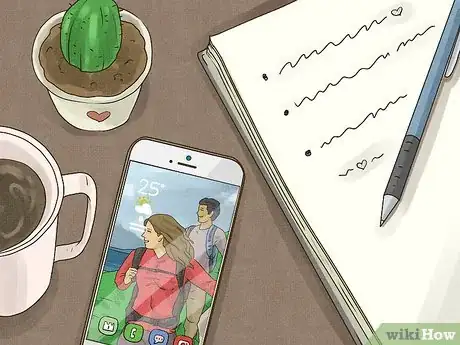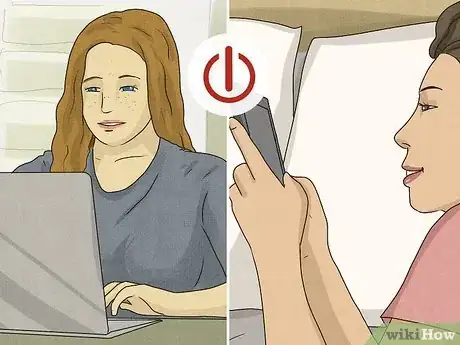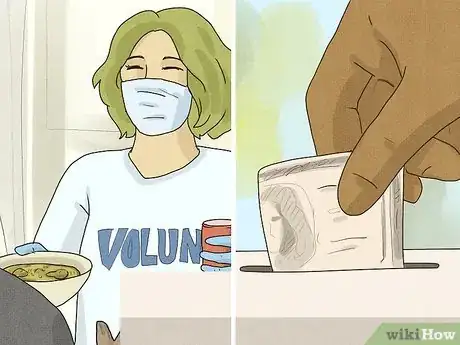This article was co-authored by Kirsten Parker, MFA. Kirsten Parker is a Mindset and Action Coach based in her hometown of Los Angeles, California. She helps high achievers overcome stress and self-doubt. She specializes in increasing one's confidence and clarity by incorporating tools from positive psychology, mindful habit change, and self-regulation into her coaching. She is a Certified HeartMath Practitioner trained in Stress, Anxiety, and Intelligent Energy Management along with Emotional Intelligence and the Science of Self-Acceptance. She also holds an MFA from Yale University School of Drama in Stage Management.
This article has been viewed 64,801 times.
The old expression about seeing a glass as half-full or half-empty may have a ring of truth to it. When you’re dealing with tough times, it’s easy to feel overwhelmed. A positive outlook can really help you cope with your situation and find potential solutions, and though it may seem difficult, there are some things you can do to keep positive during hard times. To make things a little easier for you, we’ve put together a list of ideas you can use to help boost your mood and see your circumstances in a more positive light.
Steps
Acknowledge the good things in your life.
-
Practice gratitude for everything you have. Instead of thinking of all of the negative things you’re dealing with right now, try to think about the positives. Focus on what you do have going for you rather than what you don’t.[1] X Trustworthy Source Harvard Medical School Harvard Medical School's Educational Site for the Public Go to source
- For instance, if you’re struggling with finances right now, you can practice gratitude by thinking about some of the things that you do have, such as a place to live and a tasty meal to eat.
- You can be grateful for anything you have, whether it’s tangible or intangible. For example, if you have a loving partner or a great friend to support you, that’s a great thing!
- If it helps, try making a list of everything that you’re grateful for.
- Even if you’re dealing with something really difficult, like the death of a close friend or loved one, you can find gratitude in the happy memories you have of them.
Look at your situation from a new perspective.
-
Think about the positive things that can come as a result. When you’re dealing with a lot of difficult or stressful things at once, it can be easy to fall into the trap of seeing yourself as a victim of circumstance. Instead, think about what got you into the situation and why things are tough right now. Try to think about the potential positive things that can happen and what you can do to try to improve your situation.[2] X Research source
- Asking questions can help you get to the root of the problem. For instance, if you’re failing a class, you can ask yourself why you’re struggling and what steps you can take to turn things around.
- If you were laid off or fired from your job, for example, don’t think about it as something you’ll never recover from. Instead, consider all of the new possibilities open to you and the new potential jobs you could try to get.
Focus on what you can control.
-
Don’t worry about the things you can’t. It can feel like the world is piling on top of you during tough times, but it’s important that you keep your perspective focused on what’s important. Even if there are a ton of things going on right now, you can’t solve all of the world’s problems. Think about the actions you can take and what you can actually do about your situation.[3] X Trustworthy Source HelpGuide Nonprofit organization dedicated to providing free, evidence-based mental health and wellness resources. Go to source
- For example, if you’re unemployed and you’re struggling to find a job, focus on things you can do, such as spending time searching for available jobs, sending resumes, and filling out applications, instead of worrying about when you’ll get a response or stressing about the jobs you didn’t get.
- If you’re struggling with a health problem such as obesity, you could try asking questions like, “What can I do to improve my health?” and come up with solutions such as, “I can make sure I have some veggies with each meal and take a walk at least once a day.”
Remind yourself of other difficult times you've made it through.
-
Remember that things will eventually get better. When you’re feeling especially down, focus on times in the past where things were tough and then got better. Remember that you’ve gotten through hard times before and you can do it again. You’ll get through this and you’ll be stronger because of it.[4] X Trustworthy Source HelpGuide Nonprofit organization dedicated to providing free, evidence-based mental health and wellness resources. Go to source
- It can feel difficult to see past your current situation, but if you look to the past, you can see proof that you can make it through this.
- For instance, if you’re dealing with a serious injury or illness right now, think about medical issues you’ve had in the past that you were able to overcome. Even if it takes some time, you can make it through this.
Spend time with positive people.
-
Surround yourself with people who can uplift you. It’s human nature to respond and react to the people around us. So if you have negative people around you, you’re going to feel negative, which is especially bad if you’re going through some hard times. Try to find people who have a positive outlook on life and spend time with them. It may boost your mood and help you better deal with your circumstances.[5] X Research source
- Try to avoid spending time with people who fuel negative emotions and make you feel even more stressed out.
Do things you enjoy.
-
Your hobbies and interests can keep your spirits up. Just because times are tough doesn’t mean you should put aside or ignore the things that make you happy. Continue to make time for you to pursue any hobbies or passions that you have, which can help you cope with the stress of difficult times.[6] X Trustworthy Source HelpGuide Nonprofit organization dedicated to providing free, evidence-based mental health and wellness resources. Go to source
- For instance, if you love to draw, play music, play sports, or spend time in nature, don’t put your interests on pause when you’re struggling. They’re still important and they’ll help you manage your stress.
- You can also pick up a new hobby or try out something you’ve always wanted to do. For instance, if you’ve wanted to try yoga or get into knitting, set aside some time each day to try it out!
Take a screen-time break for your mental health.
-
Give your mind a break from your phone, computer, and TV. If you’re dealing with hard times, seeing negative news stories and other people’s fake personas on social media can make you feel worse. Try going for a walk or grabbing a coffee with a friend. You could also read a good book or spend some time doing a hobby you enjoy. Take a break from the news, social media, and any apps that take up your time. It can really work wonders for your mental health.[7] X Research source
- Many people on social media present the best or exaggerated versions of themselves. It’s not healthy to compare yourself to them and it can really take a toll on your mental health. Give yourself a break and take some time off from social media if it makes you feel bad about yourself.
Practice breathing meditation.
-
Relax your mind so you can see things more clearly. When you’re stressed out or struggling with something, it’s easy to feel mentally overwhelmed. Mediation can help you see things more clearly, which may help you come up with solutions to any problems you’re having. Try some simple breathing meditation by closing your eyes and taking slow and deep breaths, inhaling through your nose and exhaling out of your mouth.[8] X Trustworthy Source HelpGuide Nonprofit organization dedicated to providing free, evidence-based mental health and wellness resources. Go to source
- Breathing meditation will make you feel calmer and more relaxed, which is also great if you’re super stressed out.
Contribute to charity.
-
Volunteer your time or make a donation. It may seem difficult to find the motivation to help others while you’re dealing with hard times yourself, but research suggests that people who volunteer their time tend to be happier than people who don’t. Try doing something to help your community. Look for community or volunteer groups in your area that you can join to give something back. You may find it helps keep you feeling more positive about yourself and your situation.[9] X Trustworthy Source HelpGuide Nonprofit organization dedicated to providing free, evidence-based mental health and wellness resources. Go to source
- For instance, you could spend time helping out at your local food bank or homeless shelter. It doesn’t cost you anything and you can make a genuine contribution.
- If you do have the financial means, donating to a charity or a cause that you believe in can help support them and make you feel better about yourself and your circumstances.
Ask for help if you need it.
-
It can be physical, mental, or emotional support. Reach out to a friend or coworker to help you with some of your tasks if you’re overextended. If you aren’t sure what to do about a tough situation, try asking someone you trust and respect for advice. Don’t be embarrassed to cry out or share your frustrations with a friend or family member, either. You don’t have to bottle up your emotions and deal with everything on your own. There are people who love and care about you and who may be able to help.[10] X Research source
- For instance, if you just lost a loved one and you suddenly find yourself struggling to deal with it, don’t keep it to yourself. Call or visit a close friend or family member and tell them how you’re feeling, even if you just need to vent or cry it out.
Warnings
- If you feel depressed or if you have thoughts about hurting yourself, reach out for help. Talk to a mental health professional such as a counselor, therapist, or psychiatrist. You don’t have to deal with it alone.⧼thumbs_response⧽
You Might Also Like


 Have You Lost Your Faith in Humanity? Learn How to Restore It and Why You Lost It
Have You Lost Your Faith in Humanity? Learn How to Restore It and Why You Lost It







 How to Build a Positive Thinking Mindset
How to Build a Positive Thinking Mindset

 12 Ways to Be a More Carefree and Energetic Person
12 Ways to Be a More Carefree and Energetic Person

References
- ↑ https://www.health.harvard.edu/blog/staying-positive-during-difficult-times-2020100121047
- ↑ https://www.forbes.com/sites/francesbridges/2018/09/28/how-to-stay-positive-in-dark-times/?sh=15afc52631e6
- ↑ https://www.helpguide.org/articles/stress/surviving-tough-times.htm
- ↑ https://www.helpguide.org/articles/stress/surviving-tough-times.htm
- ↑ https://medium.com/mind-cafe/how-to-stay-positive-when-life-gets-difficult-9f665db2087
- ↑ https://www.helpguide.org/articles/stress/surviving-tough-times.htm
- ↑ https://www.forbes.com/sites/francesbridges/2018/09/28/how-to-stay-positive-in-dark-times/?sh=15afc52631e6
- ↑ https://www.helpguide.org/articles/stress/surviving-tough-times.htm
- ↑ https://www.helpguide.org/articles/stress/surviving-tough-times.htm
About This Article
























































